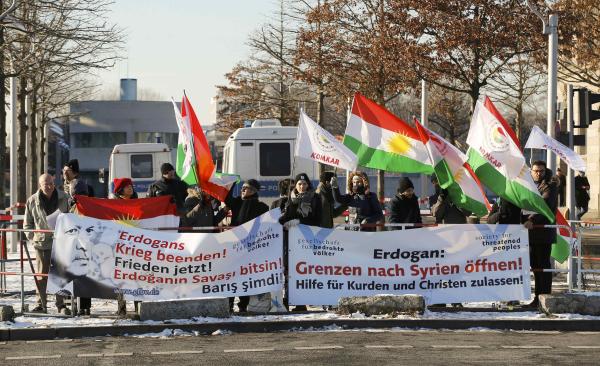Speaking of land distance, the violent clashes taking place in Turkey between Turkish soldiers and Kurds regularly are in a way and another very far from Germany. Nevertheless, the conflict is progressively taking part in Germany as well, where almost 1.5 million Turks live, which is much more than the number of Turks living in any other country apart from Turkey.
Kurdish protesters interrupted a march that took place on Sunday by about 600 Turkish protesters against terrorism by the ISIS and the Kurdistan Workers’ Party. Noting that, when 36 ethnic Kurds were caught up by authorities last weekend after attacking a demonstration of Turkish protesters in the Bavarian town of Aschaffenburg, authorities became aware of the full dimensions that there is a chance for the conflict to take in Germany.
Accordingly, the last number of clashes that took place between Kurds and Turkish people lead authorities to fear that tensions may escalate even more in the future. Noting that Germany invited Turkish citizens back in 1960’s to move to the central European country as “guest workers”. At that time, Germany was going through an economic boom but lacked workers to fill vacancies. While German authorities initially expected that most of the Turkish workers would eventually return to their home country, many of them stayed.
Even though many Turkish immigrants in Germany are integrated with the country’s society, they still hold voting rights in their country of origin. Therefore Turkish citizens who are living in Germany were allowed in 2014 to directly vote for their president from Berlin for the first time. Back then, the Turkish government rented Berlin’s largest stadium in 2014 to host 140,000 eligible voters, although it is common for expatriates to be allowed to vote in elections at embassies or consulates.
From another side, the emergence of “parallel societies” in Germany has been criticized specifically by conservative politicians as a consequence of the large number of Turkish immigrants. German Chancellor Angela Merkel emphasized: “Multiculturalism leads to parallel societies and therefore remains a ‘life lie,’ ” or a sham, at a party convention in December where the latter was talking about the influx of refugees into the country – however her conclusion was mostly based on the experience with Turkish immigrants.
This was not the first time that Merkel says such similar statements, where back in 2010 she expressed alike thoughts where she said: “Of course the tendency had been to say, ‘Let’s adopt the multicultural concept and live happily side by side, and be happy to be living with each other.’ But this concept has failed, and failed utterly.”
German authorities now fear that the existence of such parallel societies may result in violent clashes between Kurds and Turks in the middle of Europe. Germany’s Der Westen newspaper published an article on Thursday stating that the Kurdish-Turkish conflict was increasingly spreading in various western German cities. According to the paper, German authorities monitor the right-wing nationalistic Turks “due to racist activities.”
Although German agencies only recently expressed concerns over possible violence in the coming months, the tensions are not completely unexpected. Already in 2014, Germany’s Der Spiegel magazine had argued that then-Turkish Prime Minister Recep Tayyip Erdogan was fueling tensions in Germany:
Many Turkish-Germans feel that politicians here don’t take their concerns seriously. The Turkish government has tried to fill this gap, with Erdogan posing as the patron of the Turkish diaspora. (…) Such aggressive rhetoric has driven a wedge between immigrants and German society.
Erdogan, who is now Turkey’s president, had repeatedly visited Germany to hold rallies. Allowing Kurdish-Turkish tensions to grow for years is something German authorities and leading politicians may now regret.
germany-turkey.
